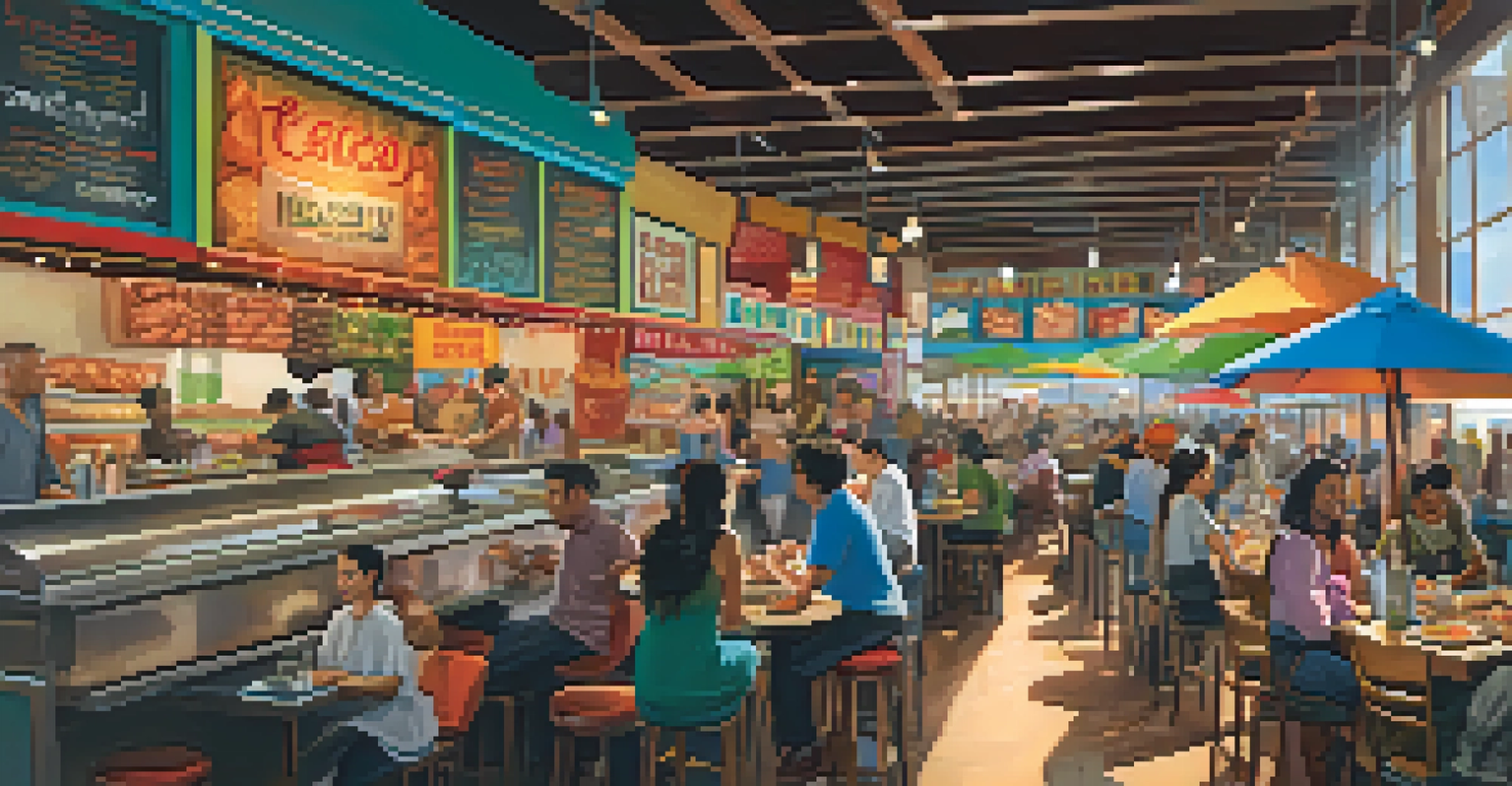Modern Dining Trends: Atlanta's Evolution in Culinary Arts

The Rise of Farm-to-Table Dining in Atlanta
In recent years, Atlanta has embraced the farm-to-table movement, which emphasizes fresh, locally sourced ingredients. This trend not only supports local farmers but also enhances the dining experience by offering seasonal menus that reflect the region's bounty. Restaurants like The Farmhouse and Miller Union are shining examples, showcasing how simple, high-quality ingredients can create extraordinary dishes.
Food is not just what we eat; it is a reflection of who we are and where we come from.
The farm-to-table approach is about more than just food; it's a philosophy that connects diners with the land and the people who cultivate it. By knowing where their food comes from, patrons develop a deeper appreciation for culinary arts. This connection is especially important in a city like Atlanta, where the culinary landscape is rich and diverse.
As more restaurants adopt this model, diners are beginning to expect transparency in sourcing and sustainability practices. This shift encourages chefs to get creative with their menus, experimenting with ingredients that highlight the best of Georgia's agricultural offerings.
Exploring the Influence of Southern Cuisine
Southern cuisine has always played a pivotal role in Atlanta's culinary scene, but modern interpretations are taking it to new heights. Chefs are blending traditional Southern flavors with contemporary techniques, resulting in dishes that are both nostalgic and innovative. Think fried chicken with a gourmet twist or classic biscuits served with artisanal jams.

This evolution reflects a broader trend in which chefs are honoring their roots while also pushing the envelope. The result is a vibrant fusion of flavors that appeals to both locals and visitors alike. Notable establishments like Gunshow and Staplehouse are redefining Southern dining by incorporating seasonal ingredients and global influences.
Farm-to-Table Dining Grows Popular
Atlanta's restaurants are increasingly focusing on locally sourced ingredients, enhancing both the dining experience and community support.
Moreover, this modern Southern cuisine movement fosters a sense of community. By celebrating local traditions and flavors, chefs are creating spaces where diners can connect over shared experiences, making each meal a journey through Atlanta's rich culinary heritage.
The Growth of Global Flavors in Atlanta
Atlanta's dining scene is increasingly becoming a melting pot of global flavors, showcasing the city's multicultural fabric. From Ethiopian injera to Vietnamese pho, the variety of cuisines available reflects the diverse population that calls Atlanta home. This trend not only introduces diners to new tastes but also fosters cultural appreciation and understanding.
Cooking is like love. It should be entered into with abandon or not at all.
Restaurants like Buford Highway Farmers Market exemplify this global influence, offering everything from authentic Mexican tacos to Korean barbecue under one roof. Such establishments encourage adventurous eating, allowing diners to explore world cuisines without leaving the city. This culinary diversity is not just a trend; it’s an integral part of Atlanta's identity.
As chefs and restaurateurs continue to experiment with international dishes, they often incorporate local ingredients, creating unique hybrids that celebrate both global traditions and Southern roots. This innovative approach keeps the dining experience fresh and exciting, encouraging food lovers to return for more.
The Impact of Technology on Dining Experiences
Technology is reshaping how we dine out, from online reservations to digital menus. In Atlanta, many restaurants have embraced these tools to enhance the customer experience, making it easier to order, pay, and even interact with chefs. This shift not only improves efficiency but also caters to the growing demand for convenience in today's fast-paced world.
One notable trend is the rise of restaurant apps, which allow diners to browse menus, make reservations, and even place orders for takeout. Establishments like Taverna and Atlanta Food Truck Park are leveraging technology to streamline their services and engage with customers in real-time. This integration of tech and dining not only attracts younger clientele but also keeps traditional diners coming back for the ease it offers.
Casual Dining and Food Halls Thrive
The rise of casual dining and food halls in Atlanta offers diverse culinary options in relaxed, communal settings that appeal to modern diners.
Additionally, social media has transformed how restaurants market themselves. Platforms like Instagram are now vital for showcasing beautifully plated dishes and creating buzz around new menu items, allowing restaurants to connect directly with their audience. This dynamic interaction fosters a sense of community and anticipation for what’s to come.
Sustainable Practices in Atlanta's Restaurants
Sustainability has become a cornerstone of modern dining, and many Atlanta restaurants are leading the charge. From composting programs to zero-waste initiatives, eateries are implementing practices that reduce their environmental impact. This commitment to sustainability resonates with eco-conscious diners who are increasingly making choices based on a restaurant's values.
Restaurants like The Spotted Trotter and Ponce City Market are excellent examples of how sustainability can be woven into the fabric of a dining experience. They focus not just on sourcing local ingredients, but also on minimizing waste and promoting responsible consumption. Such practices not only benefit the planet but also create a positive dining atmosphere.
Moreover, many restaurants are educating their staff and patrons about the importance of sustainable practices. By fostering a culture of environmental awareness, these establishments are not only changing the way people eat but also encouraging a broader movement towards sustainability in the culinary world.
The Rise of Casual Dining and Food Halls
Casual dining has taken center stage in Atlanta, as more people seek relaxed environments where they can enjoy quality food without the formalities of traditional restaurants. Food halls, like Krog Street Market and Ponce City Market, have gained popularity by offering diverse culinary options in a communal setting. This trend caters to a variety of tastes and dietary preferences, making it a perfect spot for groups with differing cravings.
These food halls not only provide a selection of cuisines but also create a vibrant social atmosphere. Diners can sample small plates from different vendors, allowing them to embark on a culinary adventure without committing to a single restaurant. This flexibility is particularly appealing to younger generations, who appreciate the opportunity to share and mix flavors.
Sustainability Drives Dining Choices
Many Atlanta eateries are implementing sustainable practices that resonate with eco-conscious diners, blending environmental responsibility with culinary excellence.
Additionally, the casual dining trend reflects a broader societal shift towards valuing experiences over formalities. As people prioritize social connections and memorable moments, dining becomes less about the food alone and more about the shared experience. This evolution is reshaping the landscape of Atlanta's dining scene, making it more accessible and inviting.
The Role of Community in Atlanta's Culinary Scene
Community has always been a vital part of Atlanta's culture, and this is especially true in the culinary scene. Many restaurants are not just places to eat; they are community hubs that foster connections among locals. Events like farmers' markets and food festivals highlight the importance of supporting local businesses and celebrating regional flavors.
Establishments like Community Q BBQ and Sweet Auburn Market exemplify this idea by creating spaces where locals gather to enjoy food and socialize. Such venues often host events that showcase local talent, whether through live music or culinary demonstrations, reinforcing the bond between the restaurant and the community it serves. This sense of belonging enhances the dining experience and encourages patrons to return.

As chefs and restaurateurs continue to engage with their communities, they often collaborate with local artisans and vendors to create unique dining experiences. This collaborative spirit not only enriches the culinary landscape but also strengthens the ties that bind the community together, making Atlanta a vibrant place for food lovers.